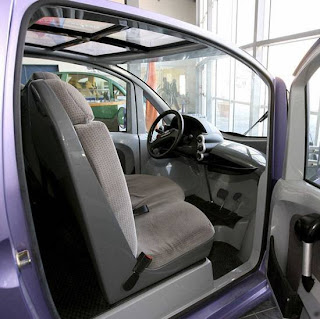





 Tata Motors to introduce Air Car -
Tata Motors to introduce Air Car -Tata Motors is taking giant strides and making history for itself. Firstthe Landrover-Jaguar deal, then the world's cheapest car and now it is alsoset to introduce the car that runs on air, compressed air to be specific.
With fuel prices touching nearly $150 per barrel, it is about time we heardsome breakthrough!India's largest automaker Tata Motors is set to start producing the world'sfirst commercial air-powered vehicle. The Air Car, developed by ex-FormulaOne engineer Guy N?gre for Luxembourg-based MDI, uses compressed air, asopposed to the gas-and-oxygen explosions of internal-combustion models, topush its engine's pistons. Some 6000 zero-emissions Air Cars are scheduledto hit Indian streets by August of 2009.
The Air Car, called the MiniCAT could cost around Rs. 3,50,000 ($ 8177) inIndia and would have a range of around 300 km between refuels.
The cost of a refill would be about Rs. 85 ($ 2). Tata motors also plans tolaunch the world's cheapest car, Tata Nano priced famously at One lakhrupees(?1200) by October.
The MiniCAT which is a simple, light urban car, with a tubular chassis thatis glued not welded and a body of fiberglass powered by compressed air.Microcontrollers are used in every device in the car, so one tiny radiotransmitter sends instructions to the lights, indicators etc.There are no keys - just an access card which can be read by the car fromyour pocket. According to the designers, it costs less than 50 rupees per100Km (about a tenth that of a petrol car). Its mileage is about doublethat of the most advanced electric car (200 to 300 km or 10 hours ofdriving), a factor which makes a perfect choice in cities where the 80% ofmotorists drive at less than 60Km. The car has a top speed of 105 kmph.Refilling the car will, once the market develops, take place at adaptedpetrol stations to administer compressed air. In two or three minutes, andat a cost of approximately 100 rupees, the car will be ready to go another200-300 kilometers.
As a viable alternative, the car carries a small compressor which can beconnected to the mains (220V or 380V) and refill the tank in 3-4 hours. Dueto the absence of combustion and, consequently, of residues, changing theoil (1 litre of vegetable oil) is necessary only every 50,000Km.] Thetemperature of the clean air expelled by the exhaust pipe is between 0-15degrees below zero, which makes it suitable for use by the internal airconditioning system with no need for gases or loss of power.
With fuel prices touching nearly $150 per barrel, it is about time we heardsome breakthrough!India's largest automaker Tata Motors is set to start producing the world'sfirst commercial air-powered vehicle. The Air Car, developed by ex-FormulaOne engineer Guy N?gre for Luxembourg-based MDI, uses compressed air, asopposed to the gas-and-oxygen explosions of internal-combustion models, topush its engine's pistons. Some 6000 zero-emissions Air Cars are scheduledto hit Indian streets by August of 2009.
The Air Car, called the MiniCAT could cost around Rs. 3,50,000 ($ 8177) inIndia and would have a range of around 300 km between refuels.
The cost of a refill would be about Rs. 85 ($ 2). Tata motors also plans tolaunch the world's cheapest car, Tata Nano priced famously at One lakhrupees(?1200) by October.
The MiniCAT which is a simple, light urban car, with a tubular chassis thatis glued not welded and a body of fiberglass powered by compressed air.Microcontrollers are used in every device in the car, so one tiny radiotransmitter sends instructions to the lights, indicators etc.There are no keys - just an access card which can be read by the car fromyour pocket. According to the designers, it costs less than 50 rupees per100Km (about a tenth that of a petrol car). Its mileage is about doublethat of the most advanced electric car (200 to 300 km or 10 hours ofdriving), a factor which makes a perfect choice in cities where the 80% ofmotorists drive at less than 60Km. The car has a top speed of 105 kmph.Refilling the car will, once the market develops, take place at adaptedpetrol stations to administer compressed air. In two or three minutes, andat a cost of approximately 100 rupees, the car will be ready to go another200-300 kilometers.
As a viable alternative, the car carries a small compressor which can beconnected to the mains (220V or 380V) and refill the tank in 3-4 hours. Dueto the absence of combustion and, consequently, of residues, changing theoil (1 litre of vegetable oil) is necessary only every 50,000Km.] Thetemperature of the clean air expelled by the exhaust pipe is between 0-15degrees below zero, which makes it suitable for use by the internal airconditioning system with no need for gases or loss of power.
No comments:
Post a Comment